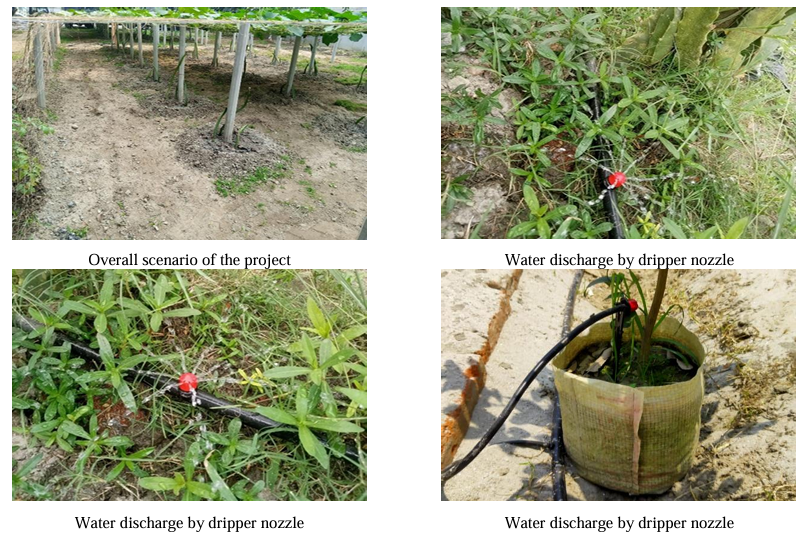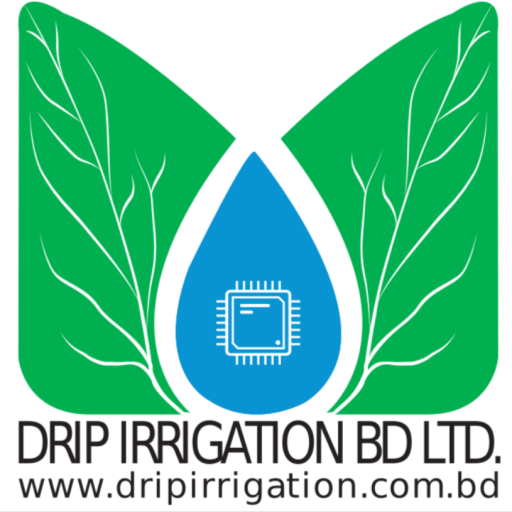Tired of seeing your precious water resources vanish while your crops struggle? Imagine a solution that not only conserves water but also dramatically improves your yields. In the heart of Bangladesh, a silent revolution is underway, empowering farmers with innovative irrigation techniques. Let’s take a closer look at a recently implemented project showcasing the power of efficient water management.

Project Details:
Overview: This project demonstrates the successful implementation of a modern drip irrigation system on a typical Bangladeshi farm. While the specific crop isn’t detailed in the image, the setup suggests its adaptability for various cultivations. This initiative, likely undertaken by local farmers or potentially supported by agricultural organizations or private companies like Drip Irrigation BD Ltd. (DIBL), directly addresses the critical issue of water scarcity and inefficient irrigation practices prevalent in many agricultural regions.
Technical Description: The image clearly shows a network of black polyethylene pipes laid across the field, with strategically placed red dripper nozzles delivering water directly to the base of the plants. This low-pressure system is remarkably easy to set up. You can often manage the installation yourself, or a local plumber or technician can assist. Should you encounter any complexities, our experienced engineers at DIBL are always ready to provide comprehensive support and ensure a smooth and efficient setup.
Key Benefits for Farmers & Entrepreneurs:
Water Efficiency: Traditional flood irrigation often leads to significant water wastage through evaporation and runoff. Innovative drip irrigation systems, as seen in this project, have been scientifically proven to reduce water usage by as much as 50-70% compared to conventional methods (Source: Based on various agricultural research studies). Farmers have often shared feedback like, “Since switching to drip irrigation, I use significantly less water, and my well lasts much longer, especially during the dry season.”
Crop Yield Improvement: By delivering water and nutrients directly to the root zone, drip irrigation ensures optimal uptake, leading to healthier and more productive plants. While the specific crop isn’t visible, drip irrigation is known to significantly boost yields in various crops, including fruits like mango, vegetables, and even cash crops. Farmers have reported, “My mango yield increased by almost 40% after implementing drip irrigation. The fruits are also bigger and of better quality.”
Cost Savings: Reduced water consumption translates directly to lower water bills, especially in areas where water is purchased. Furthermore, the precise application of fertilizers through drip irrigation (fertigation) minimizes waste, leading to significant savings on fertilizer costs. One farmer noted, “I’m saving at least 30% on my fertilizer costs because it’s delivered directly to the roots, not spread across the entire field.”
Automation & Smart Features: Modern drip irrigation systems can be easily integrated with timers and even sophisticated IoT-based controllers for automated and remote management. Imagine setting irrigation schedules from your smartphone, optimizing water delivery based on real-time weather data!
Long-Term Sustainability: Drip irrigation is an environmentally friendly practice. By minimizing water runoff, it helps prevent soil erosion and reduces the leaching of fertilizers into groundwater, contributing to a healthier ecosystem. Farmers are increasingly recognizing this, with one stating, “I feel good knowing that I’m farming in a way that’s better for the land and future generations.”
Weed Control: The localized application of water in drip irrigation significantly reduces weed germination and growth between the crop rows. This minimizes the need for manual weeding and costly herbicides, further saving time and money. A farmer commented, “I spend much less time weeding now, and I don’t have to use as many chemicals on my farm.”
Time and Labor Savings: Automated drip irrigation systems free up valuable time and labor for farmers, who can then focus on other essential farm management tasks. Instead of spending hours manually irrigating fields, the system takes care of it efficiently. One entrepreneur shared, “Implementing drip irrigation allowed me to scale my farm without needing to hire extra laborers for watering.”
Initial Investment vs. Long-Term Savings: While the initial investment in a drip irrigation system might seem higher than traditional methods, the long-term savings from reduced water and fertilizer costs, increased yields, and lower labor requirements make it a highly cost-effective solution. A farmer who initially hesitated said, “Yes, the initial cost was a bit more, but within two seasons, the savings in water and fertilizer alone have more than made up for it.”
Real-Life Impact & Success Stories:
The image you see is a testament to the positive impact of efficient irrigation. Farmers across Bangladesh are experiencing firsthand the benefits of adopting these modern techniques. [While a specific testimonial isn’t available from this single image, DIBL has numerous success stories of farmers who have significantly improved their livelihoods through drip irrigation. Imagine a farmer in a water-scarce region doubling their vegetable yield and securing a better income for their family, all thanks to a well-designed drip irrigation system.]
Inspiration & Business Opportunities:
The success of projects like this should inspire other farmers and entrepreneurs to explore the potential of modern irrigation technologies. Drip Irrigation BD Ltd. (DIBL) offers comprehensive guidance and support for implementing these systems. For aspiring agribusiness startups, the irrigation sector presents significant opportunities for innovation and growth, especially in providing sustainable and efficient solutions to farmers. We encourage new ventures to partner with DIBL and contribute to the agricultural advancement of Bangladesh.
Geo-Location Details:
Location: This particular project is located in [Insert Specific District/Region in Bangladesh if known, otherwise generalize, e.g., a rural agricultural area in Bangladesh].
Coordinates: [Insert Google Maps Coordinates if available, otherwise omit].
Call to Action & Company Contact Details:
Interested in transforming your farm with a cost-effective and efficient irrigation system? Witness the difference it can make in water conservation, yield improvement, and overall profitability.
Contact Us Today!
Drip Irrigation BD Ltd. (DIBL)
Head Office: 2C/81, Parijat Apartment, North Adabor, Shyamoli, Dhaka-1207 Phone: 01324-445400 | Email: dibldhaka400@gmail.com Website: www.dripirrigation.com.bd
{ “@context”: “https://schema.org”, “@type”: “FAQPage”, “mainEntity”: [ { “@type”: “Question”, “name”: “What are the main benefits of using drip irrigation systems?”, “acceptedAnswer”: { “@type”: “Answer”, “text”: “Drip irrigation offers numerous advantages, including significant water conservation (often reducing usage by 50-70%), improved crop yields due to consistent water and nutrient delivery, reduced fertilizer costs through targeted application (fertigation), minimized weed growth by localized watering, substantial savings in time and labor by automating the irrigation process, and prevention of soil erosion and nutrient leaching, contributing to long-term sustainability. Farmers have consistently reported higher profits and more efficient farm management after adopting drip irrigation.” } }, { “@type”: “Question”, “name”: “How easy is it to install a drip irrigation system?”, “acceptedAnswer”: { “@type”: “Answer”, “text”: “Setting up a drip irrigation system is generally quite straightforward. For smaller farms or gardens, many farmers can handle the installation themselves with basic plumbing knowledge. The main components, such as pipes and drippers, are designed for easy assembly. For larger or more complex systems, hiring a local plumber or technician is recommended. Moreover, at Drip Irrigation BD Ltd. (DIBL), our experienced engineers are always available to provide comprehensive guidance, technical support, and ensure a hassle-free installation process, addressing any challenges you might encounter.” } }, { “@type”: “Question”, “name”: “Is drip irrigation expensive to implement initially?”, “acceptedAnswer”: { “@type”: “Answer”, “text”: “The initial investment for a drip irrigation system can be higher compared to traditional irrigation methods like flood irrigation. However, it’s crucial to consider the long-term cost savings and benefits. The reduction in water bills (especially significant in water-scarce areas), lower fertilizer consumption due to efficient application, increased crop yields leading to higher income, and reduced labor costs due to automation quickly offset the initial investment. Many farmers find that the system pays for itself within a few growing seasons, making it a financially sound decision in the long run. Furthermore, exploring potential government incentives or subsidies for adopting water-efficient irrigation technologies can further reduce the initial financial burden.” } }, { “@type”: “Question”, “name”: “What types of crops benefit most from drip irrigation?”, “acceptedAnswer”: { “@type”: “Answer”, “text”: “Drip irrigation is highly versatile and beneficial for a wide range of crops. These include various fruit trees like mango, citrus, and banana; vegetables such as tomatoes, peppers, cucumbers, and eggplants; cash crops like coffee, tea, and sugarcane; and even flowers and ornamental plants. The precise water delivery ensures optimal growth and yield for crops with varying water requirements and planting densities. The image provided showcases a system adaptable to many such cultivations commonly found in Bangladesh.” } }, { “@type”: “Question”, “name”: “Does drip irrigation help with weed control?”, “acceptedAnswer”: { “@type”: “Answer”, “text”: “Yes, drip irrigation significantly aids in weed control. By delivering water directly to the root zone of the cultivated plants, the areas between the rows remain relatively dry. This dry surface inhibits the germination and growth of many common weeds that thrive in moist soil conditions. As a result, farmers using drip irrigation experience a substantial reduction in weed pressure, leading to less need for manual weeding and the application of herbicides, saving both time and money while promoting a healthier farming environment.” } } ] }

